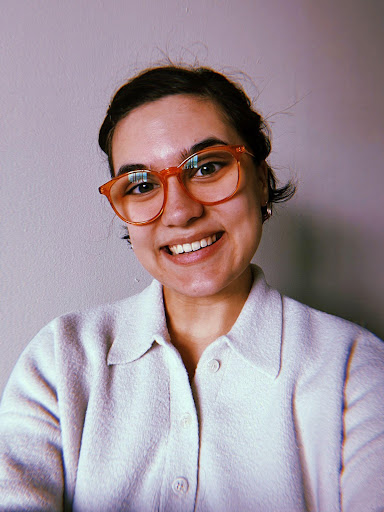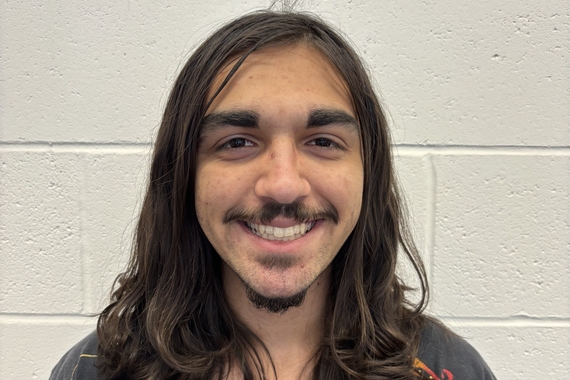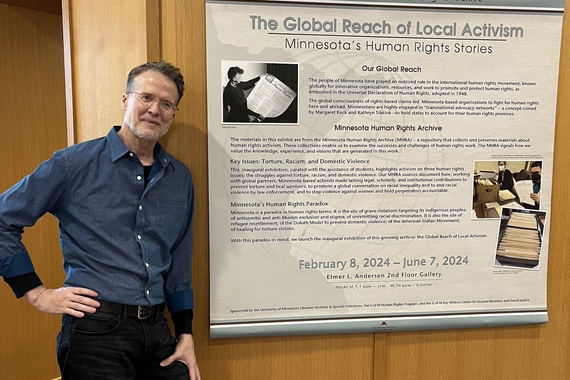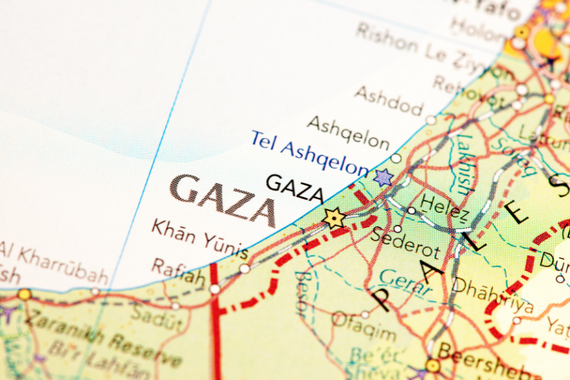Combating gender-based violence in Central and Eastern Europe
The Master of Human Rights Degree Program strongly believes in the importance of integrating professional experience with academic knowledge in the field of human rights, making internships one of the central aspects of the program. Many students, despite challenges posed by the spread of COVID-19 and challenges related to working in the field defending human rights, succeeded in doing amazing work with their host organizations. In this Q&A series, we interview our students to learn more about their experiences. In the sixth Q&A of the series, we are joined by Ariana Kopycinski, a second-year Master of Human Rights (MHR) student to learn about her internship with The Advocates for Human Rights.
Human Rights Program (HRP): Can you tell us more about your educational background, specifically at the University of Minnesota, and your professional experience? How did both contribute to your decision in choosing this particular internship and the host organization?

Ariana Kopycinski (AK): I am in my final semester working towards a Master of Human Rights degree at the University of Minnesota, with a concentration in International Development. I am originally from Wichita, Kansas, and I attended Wichita State University and graduated with degrees in Sociology, Political Science, and Gender studies. My interdisciplinary background has provided me with the opportunity to explore broad interests within the field of human rights, including reproductive justice, labor rights, and food security. Professionally, I am an experienced campaign worker, canvasser, and account manager in the nonprofit sector, and I have a passion for social justice, progressive policy change, and community engagement. My professional experience and previous academic work in research and gender studies directly informed my choice in interning with The Advocates for Human Rights’ Women’s Human Rights division.
(HRP): Please describe your summer internship, the host organization, your role in that organization, and the projects you worked on.
(AK): My summer internship was with The Advocates for Human Rights through their Women’s Human Rights division. As an organization, The Advocates for Human Rights seeks to implement international human rights standards to promote civil society and reinforce the rule of law through research, education, and advocacy. For the majority of the summer, I worked closely with Women’s program staff to complete a major report regarding countries’ adherence to the Council of Europe’s Istanbul Convention, an international legal framework related to combating domestic violence and gender-based violence. For this report, I honed my research and interview skills and developed knowledge on gender-based violence in an international context by researching gender-based legal practices and social movements happening in central and eastern European countries, including Armenia, Croatia, the Czech Republic, Hungary, Italy, Latvia, Lithuania, Moldova, Poland, Romania, Slovakia, Turkey, and Ukraine. I managed extensive citation libraries and performed detailed edits to the report and its accompanying appendices. In addition to the international focus of this internship, I also explored local gender-based violence issues through analyzing court observation data related to domestic violence and sexual assault judicial proceedings in Hennepin, Ramsey, and Washington county courts.
(HRP): How did the internship add to your professional experience and personal growth? and how do you see it impact your career trajectory especially with regards to internationally-focused human rights work?
(AK): Some of the most significant insights I gained from my work at The Advocates involve the work I contributed to the Istanbul Convention report. My research skills expanded greatly, and I developed a strong proclivity for managing citation libraries and performing citation and line edits to the report. My work on the report exposed me to new research techniques, as most of the work involved international expertise and materials. Additionally, The Advocates for Human Rights is an organization that partners with many different entities in Minnesota and around the world, including civil society groups, government officials, and individual human rights defenders. One of the most impactful aspects of this internship for me was learning how essential those partnerships are in practice and how coalitions of people working towards the same goal can create real, impactful change. All of the tasks and experiences I had throughout this internship reinforced my desire to work internationally within the field of human rights while deepening my interest and respect for the particular sector related to women’s rights.
(HRP): Doing your internship during Covid-19 and focusing on gender-based violence in a new geographical area can be very challenging. What were the main challenges you faced during your internship on both a personal and a professional level? And how did you overcome them?
(AK): Logistically, my work on the Istanbul Convention report required me to use specific software and access particular materials, so I was lucky enough to be able to work in person for my entire internship. This presented the specific challenge of working in person at the height of the pandemic, making it difficult to maintain personal safety while contributing to the work. Additionally, working in person while many others at The Advocates remained remote presented an interesting challenge for making connections and developing relationships on a personal and professional level. However, I still appreciated the multitude of perspectives I was exposed to through the internship across each of the Advocates’ programs, and the inter-departmental mentorship program that the organization employed for interns throughout the summer was an excellent opportunity to discuss projects occurring outside of the Women’s program.
(HRP): Through your experience working on this important report on gender-based violence, what were the most important setbacks that the report monitored with regard to addressing violence against women, and what were the most important recommendations made by the report to address these setbacks?
(AK): The report monitored the backlash to human rights, especially women’s rights as they relate to the Istanbul Convention in Europe, primarily central and eastern Europe. The report explores the roots of the radical right in Europe and how their networks have infiltrated important institutions that influence policy on gender issues, such as reproductive rights, domestic violence, and LGBTQIA+ rights. We researched how “gender ideology” misinformation has spread in Europe in connection with the Istanbul Convention and looked at increasing attacks on civil society as a result of “gender ideology” rhetoric. The radical right groups and their footholds in government claim that the language used by the Istanbul Convention promotes “gender ideology” and that the convention will erode traditional and religious values in Europe. Such claims include that the convention promotes same-sex relationships, transgender lifestyles, and abortion-as-birth control, which threaten conservative ways of life, particularly for children. The report debunks these myths and uncovers how radical right groups are attempting to overturn legal protections for victims of gender-based violence. In its recommendations, the report targets civil society, the United Nations and other international treaty bodies, the European Union, national governments, funders, and any individual or collective supporters of the Istanbul Convention to prioritize and recognize the backlash against the Istanbul Convention and to coalesce to prevent more violence. Each actor and stakeholder can create change on their own levels of operation, whether that be internationally, organizationally, or individually, and the report’s recommendations hone in on what can be done on all levels. Some of the most important recommendations, in my opinion, include:
- Individual supporters: Educate yourself and others. Tell your friends, family, and colleagues about the Istanbul Convention and its importance in saving women’s lives. Create an educational mural, poster or flyer with statistics, stories, and other attention-grabbing information on a human rights issue. Distribute it in your city, school, or workplace.
- Civil society: Use strategic messaging. Collect and tell stories about the victims NGOs serve. Personalize the problem by sharing the stories of individuals, with their consent or anonymizing the account, and the impact the NGO has on them, their children, their safety, and their lives. Use these stories to rebuild public trust and understanding of the work of civil society.
- The UN, HRC, special procedures, UPR, and OHCHR: Local country and regional OHCHR offices should allocate funding, training, and technical assistance in order to build the capacity of human rights defenders to resist and counteract the backlash against the Istanbul Convention and to promote public awareness about the Istanbul Convention.
- The EU: Adopt a comprehensive EU-wide strategy, action plan and legislation on preventing and combating violence against women and girls in Europe.
- National governments: Adequately fund and consult with NGOs serving victims of violence against women in the implementation of the Istanbul Convention. These NGOs best know and understand victims’ needs and should have a leadership role in the implementation of the convention.
- Funders: Invest in building the capacity, in particular on communications and networks, in the reviewed countries, as well as engaging investigative journalists to highlight the issue pertaining to the Istanbul Convention and opposition actors.


